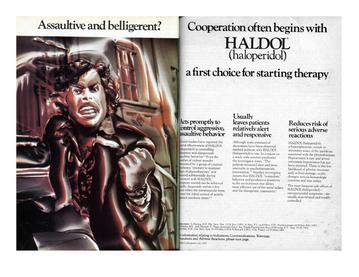Great to listen to a friend Dina Tyler tell her story. With a clear voice speaking truth to power, Dina works to open minds to something different than coercion and forced treatment.
Black Lives Matter: Schizophrenia – from sexist to racist.

In case you had any doubts, mental health disorders are socially constructed and reflect a job of the mental health profession to enforce the dominant cultural norms. The disorders and their check list criteria are voted on by psychiatrists, who by the way are largely being paid by drug companies. I recently re-listened to a Madness Radio interview available as a podcast as well as here of the psychiatrist Jonathan Metzl, author of The Protest Psychosis: How Schizophrenia became a Black Disease.
I wanted to remind myself of some of the things I previously heard about Schizophrenia before the 1960’s being associated with frail or nervous housewives who were distressed about their role or embarrassing their husbands. These days there is a common association of violence with the Schizophrenia diagnosis. How did that happen? Could it be systemic racism?
The interview highlights how in the 1960’s there was an increase in the professional literature of case studies of angry black male protesters suffering from new manifestations of Schizophrenia with symptoms such as hostility, aggression, and violence. Then in 1968, aggression and hostility were added to the schizophrenia diagnosis in the DSM manual of mental disorders.
Dr. Metzl discussed how black protesters were locked away in mental institutions. Black men would experience paranoia about the police and doctors, another symptom of schizophrenia. Black Lives Matter protesters in the past couple of weeks have brought to light the black and brown people’s justified fear of police, not paranoia.
Male breastfeeding article published in Rebelle Society
Yes you read correctly. I have published a piece on male breastfeeding. I thank my wife for giving assent to publish such a peephole into our private home life conversation that inspired the writing. I wrote specifically for Rebelle Society a platform for “creatively maladjusted rebels with a cause.” My heart sobs regularly for so many treated by the mental health system by force or without information given regarding the consequences of treatment and alternatives to wellness. I sat on the edited article for many months. Then, while with my family at the nearby river on one of the hottest days of the summer I noticed a lone topless woman among the crowd enjoying the river. My 8-year-old daughter had been complaining for days about having to wear shirts when it was so hot, and yes she was quite right. It is just plain wrong that only males are privileged to go topless in public. It was time to do my miniscule part to confront sexism by airing the topic of male breastfeeding. If males bodies have the potential to grow breasts and produce milk, then why should one gender be expected to cover them and another not?
Check out the article here.
Update:
2-months after I published this piece in Rebelle Society, 2 related pieces were published in the New York Times.
First was an opinion piece by a professor at Stockholm University regarding if society is ready for the breastfeeding father and explores historical evidence of male breastfeeding that I had touched on available here.
Second, and part of my motivation for my writing to get information out that has been minimized is an article about an $8 billion jury award against Johnson & Johnson for a boy who grew breasts when given risperdal at 9 years of age available here.
What Johnson & Johnson has done to children is criminal and the article points out that in 2013 they settled for $2.2 billion in criminal and civil fines related to illegal marketing that has harmed children. Of course the fines do nothing to change criminal business practices as the article points out about $82 billion in revenue came in to Johnson & Johnson in 2018 alone.
